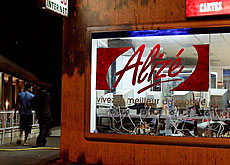Swiss president censored by Tunisia

Swiss President Samuel Schmid has been censored by Tunisian television for harshly criticising states that muzzle civil liberties.
Schmid’s comments at the opening of the World Summit on the Information Society (WSIS) in Tunis drew lengthy applause from delegates who were his only audience.
“It is, quite frankly, unacceptable for the United Nations to continue to include among its members states which imprison citizens for the sole reason that they have criticised their government on the internet or in the media,” Schmid said in his opening speech.
“As far as I’m concerned, it goes without saying that here in Tunis – inside these walls as well as outside – everyone can express themselves freely. It is one of the conditions sine qua non for the success of this international conference.”
He added that any knowledge society “respects the independence of its media as it respects human rights”.
Schmid was referring to various recent incidents in which members of international civil society and the media have experienced firsthand the Tunisian government’s physical reaction to negative analysis.
One journalist was stabbed in Tunis, many others assaulted and WSIS-related websites have been blocked.
Humour
After his candid comments Schmid retook his seat next to Tunisian President Ben Ali, who appeared unruffled by such high-level censure.
Ben Ali knew that Canal 7, Tunisia’s public television channel, would cut to a commentator as soon as the Swiss president launched into his broadside.
At a news conference after the speeches, Schmid – who received no official Tunisian welcome on his arrival at Tunis airport – used humour to try to deflect a diplomatic incident.
“I was met by the head of protocol and the Swiss ambassador – what more do you want?” he said. “In Switzerland we are pragmatic and not complicated.”
Despite having his freedom of expression restricted, Schmid said the discussions must go on.
“We’re dealing with a process and I am convinced that events such as this summit are beneficial.”
Negative influences
Ben Ali for his part welcomed the delegates and thanked the international civil society for its “commendable levels of work during the period of preparation”.
He added that while he was “eager” to develop access to the internet for individuals, a set of standards and ethical values was necessary “to protect society from negative influences”.
UN Secretary-General Kofi Annan shed no light on what these negative influences could be but said freedom was the “life blood” of the internet and without it the information society would be “stillborn”.
Swiss Communications Minister Moritz Leuenberger takes over from Schmid on Thursday and will take part in a high-level roundtable session as well as represent Switzerland in the general debate and at the closing ceremony.
swissinfo, Thomas Stephens in Tunis
The first phase of the WSIS took place in Geneva in 2003.
The three-day second phase of the World Summit on the Information Society (WSIS) has opened in Tunis.
175 states are represented at the WSIS in Tunis.
Some 23,000 delegates from governments, UN agencies, private sector organisations, civil society and media have registered with the organisers and more than 50 heads of state are also expected to attend.
Swiss President Samuel Schmid has been censored for using his opening speech to criticise UN states that restrict civil liberties.
Canal 7, Tunisia’s public television channel, cut to a commentator before Schmid said imprisoning people for their political beliefs was “frankly unacceptable”.

In compliance with the JTI standards
More: SWI swissinfo.ch certified by the Journalism Trust Initiative












You can find an overview of ongoing debates with our journalists here . Please join us!
If you want to start a conversation about a topic raised in this article or want to report factual errors, email us at english@swissinfo.ch.